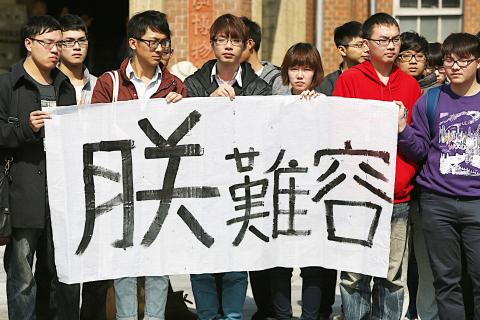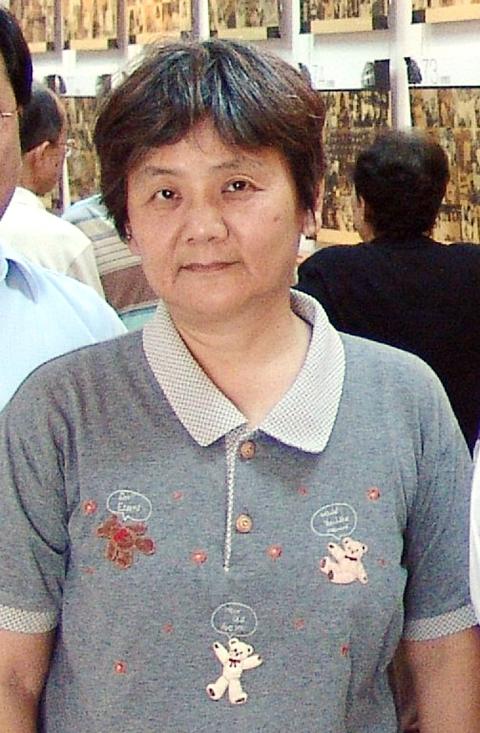History professor Wang Wen-hsia (王文霞) at National Cheng Kung University (NCKU) yesterday apologized for her remarks this week about the late activist Deng Nan-jung (鄭南榕), but that did not stop academics and students from urging the university to name a plaza on its campus after the democracy pioneer, as students had voted to do.
In a statement issued via the school, Wang apologized twice for not being able to make herself clear on Tuesday when expressing her opposition to the plaza being named “Nan-jung Square” (South Banyan Square, 南榕廣場), “due to time constraints” and for “disturbances caused to society” by the remarks.
“I did not say that Deng Nan-jung was a terrorist. The analogy [between Deng Nan-jung and] Islamist bombers was drawn when I was talking about how people deal with problems in life,” Wang said in her statement.

Photo: CNA
Wang said she meant to say young people must work hard and treasure life when facing hardship, since “I do not approve of coping with life’s challenges in such a radical way.”
The professor, specializing in 19th century and 20th century European history, said she held Deng and many other people in very high regard for their various contributions to Taiwan’s democratic development and had no intention to vilify Deng.
Wang said she did not look at the “political dimensions” of Deng’s self-immolation, but examined them from the perspectives of “education” and “respect for life.”

Screen grab from National Cheng Kung University’s Web site
“Mr Deng has an assured place in the history of Taiwan’s democratic movement. I didn’t have any intention to deny his contribution at all,” she said.
In a second statement, Wang said she sincerely apologized to Deng Nan-jung’s widow, Yeh Chu-lan (葉菊蘭), and daughter, Deng Chu-mei (鄭竹梅).
Wang said her remarks have hurt them.
At Tuesday’s meeting of the university’s School Affairs Committee, student and teacher representatives voted 70-21 in favor of not naming the plaza at all, overruling a vote in November last year in which 3,500 students, faculty members and staff chose to name it “Nan-jung Square” in honor of Deng Nan-jung, who set himself alight on April 7, 1989, in defense of freedom of expression.
Wang’s denials about the analogy of Islamic bombers and the way she perceived Deng Nan-jung’s contribution to Taiwan’s democratization process were contradicted by the transcript of her remarks provided by a student club, 02 Group (零二社).
The transcript, along with a video recording of Wang’s remarks, was uploaded online.
Later yesterday, Deng Chu-mei issued a statement in response to Wang’s statements.
The 34-year-old said her father had been a person who had respect for life, loved life and was enthusiastic about life.
“We enjoyed reading Doraemon whenever there was a new edition and were eager to find out what kinds of gadgets Doraemon pulled from its pocket. We often went to a book rental store picking up novels by [Japanese novelist] Jiro Akagawa,” she said.
Deng Chu-mei said that while her father never taught her how to deal with life’s challenges, he had encouraged her to think independently.
“We live on the same island. We need to understand each other better, so we can have a better future. It’s nothing but politics to look at life and history, not a political dimension,” Deng Chu-mei said.
“No matter what the plaza is named or whether it is not named, what they say or do along the way is a challenge for everyone,” she said.
She invited Wang, members of the School Affairs Committee, historians, education workers and people interested in related issues to visit the Deng Liberty Foundation to exchange views.
“Life is precious, we shall never give it up easily. Neither did my father,” she said.
Earlier yesterday, a group of students from several of the university’s students clubs issued a joint statement saying they would have a ceremony to formally name the plaza “Nan-jung Square” when the new semester begins.
More than 200 students yesterday staged a really on campus, demanding an apology from National Cheng Kung University President Hwung Hwung-hweng (黃煌煇).
They said the executives of the school lacked the spirit of a university and democracy, and ridiculed the university’s arbitrary decision not to name the plaza by unfurling a white banner with text, a homophone to Deng’s name, reading: “The emperor finds it [the decision] intolerable (朕難容).”
Meanwhile, representatives of the Taiwan Association of University Professors and the Ding-nan Chen Education Foundation called a press conference in Taipei demanding that the school name the plaza Nan-jung Square in accordance with the November vote.
“The naming incident showed there is still a long way to go to achieve the goal Deng Nan-jung had pursued: 100 percent freedom of expression,” professor of history at Fu Jen University Chen Chun-kai (陳君愷) said.
“We miss him so much,” he added.

CHAOS: Iranians took to the streets playing celebratory music after reports of Khamenei’s death on Saturday, while mourners also gathered in Tehran yesterday Iranian Supreme Leader Ayatollah Ali Khamenei was killed in a major attack on Iran launched by Israel and the US, throwing the future of the Islamic republic into doubt and raising the risk of regional instability. Iranian state television and the state-run IRNA news agency announced the 86-year-old’s death early yesterday. US President Donald Trump said it gave Iranians their “greatest chance” to “take back” their country. The announcements came after a joint US and Israeli aerial bombardment that targeted Iranian military and governmental sites. Trump said the “heavy and pinpoint bombing” would continue through the week or as long

TRUST: The KMT said it respected the US’ timing and considerations, and hoped it would continue to honor its commitments to helping Taiwan bolster its defenses and deterrence US President Donald Trump is delaying a multibillion-dollar arms sale to Taiwan to ensure his visit to Beijing is successful, a New York Times report said. The weapons sales package has stalled in the US Department of State, the report said, citing US officials it did not identify. The White House has told agencies not to push forward ahead of Trump’s meeting with Chinese President Xi Jinping (習近平), it said. The two last month held a phone call to discuss trade and geopolitical flashpoints ahead of the summit. Xi raised the Taiwan issue and urged the US to handle arms sales to

State-run CPC Corp, Taiwan (CPC, 台灣中油) yesterday said that it had confirmed on Saturday night with its liquefied natural gas (LNG) and crude oil suppliers that shipments are proceeding as scheduled and that domestic supplies remain unaffected. The CPC yesterday announced the gasoline and diesel prices will rise by NT$0.2 and NT$0.4 per liter, respectively, starting Monday, citing Middle East tensions and blizzards in the eastern United States. CPC also iterated it has been reducing the proportion of crude oil imports from the Middle East and diversifying its supply sources in the past few years in response to geopolitical risks, expanding

Pro-democracy media tycoon Jimmy Lai’s (黎智英) fraud conviction and prison sentence were yesterday overturned by a Hong Kong court, in a surprise legal decision that comes soon after Lai was jailed for 20 years on a separate national security charge. Judges Jeremy Poon (潘兆初), Anthea Pang (彭寶琴) and Derek Pang (彭偉昌) said in the judgement that they allowed the appeal from Lai, and another defendant in the case, to proceed, as a lower court judge had “erred.” “The Court of Appeal gave them leave to appeal against their conviction, allowed their appeals, quashed the convictions and set aside the sentences,” the judges